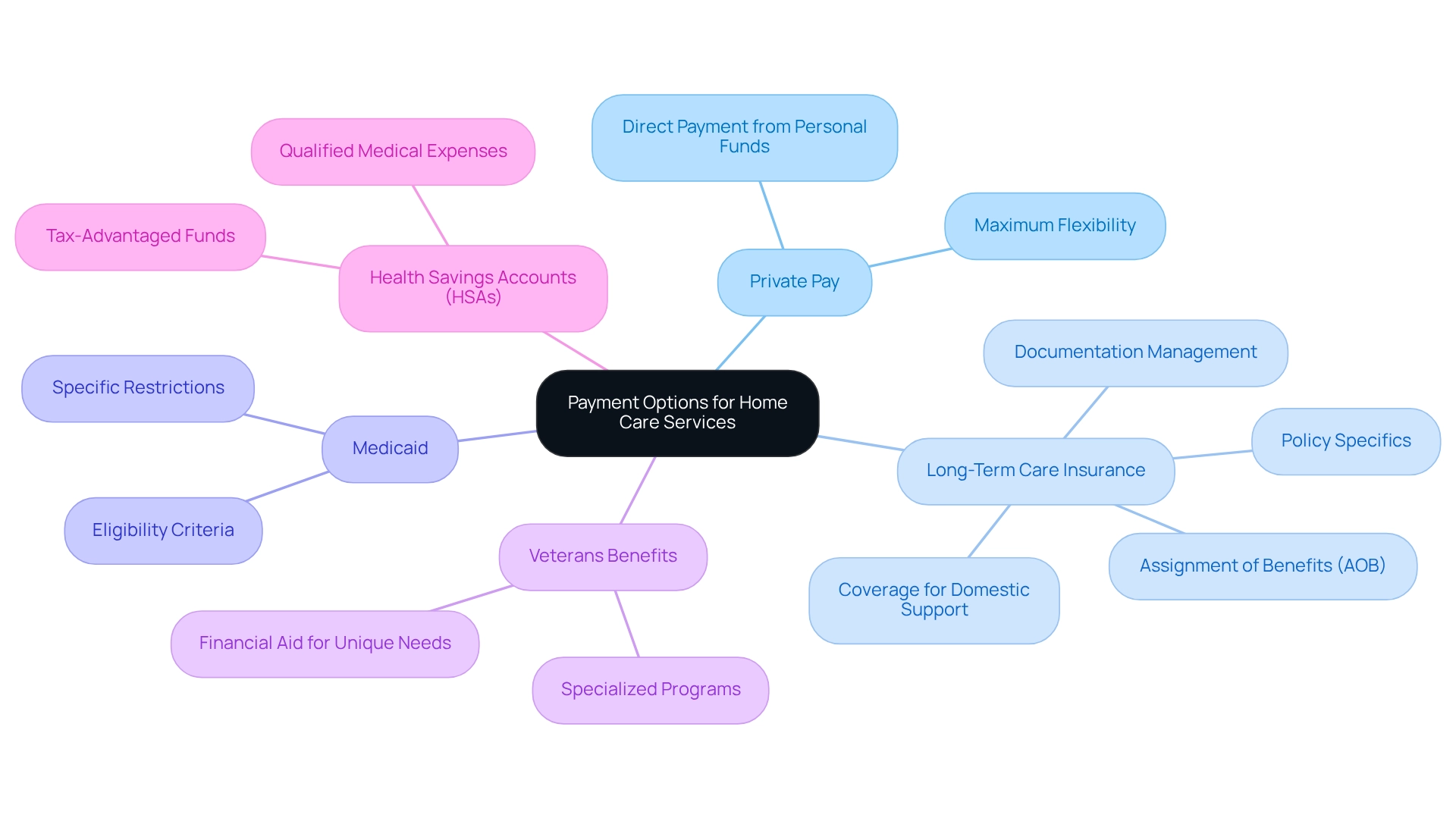Overview
Understanding private pay home care rates is essential for families seeking the best care for their loved ones. It’s important to recognize that these rates can vary significantly based on several key factors, including:
- Geographic location
- Caregiver qualifications
- The complexity of services needed
Families can expect costs to range from $1,000 to $4,000 for skilled nursing support, allowing for a wide range of options tailored to individual needs.
Private pay offers a unique opportunity for families to customize care according to specific preferences and requirements. This flexibility can be incredibly comforting during challenging times, as it ensures that care aligns with what matters most to you and your family. In addition, understanding these rates can empower families to make informed decisions that best suit their circumstances.
As you navigate this journey, remember that you are not alone. Many families face similar challenges, and there are resources available to help guide you through the process. Your comfort and peace of mind are our priorities, and we are here to support you every step of the way. If you have questions or need assistance, please do not hesitate to reach out. Together, we can find the right solution for your family’s care needs.
Introduction
Navigating the world of home care can feel overwhelming for families seeking the best support for their loved ones. Many are now discovering the benefits of private pay home care, a flexible and personalized approach that allows them to sidestep traditional insurance hurdles. This model not only provides immediate access to essential services but also empowers families to customize care based on the unique needs of their loved ones.
As home care continues to evolve, it’s crucial to understand the factors influencing rates, explore various payment options, and recognize the advantages of long-term care insurance. This article will explore the significance of private pay home care, the elements shaping its costs, and the financial avenues available to families, equipping you with the knowledge to secure the best possible care for your cherished ones.
Remember, we’re here for you every step of the way.
Define Private Pay Home Care and Its Importance
Private pay support encompasses assistance that households directly fund, steering clear of insurance or governmental programs. This approach offers remarkable adaptability and customization, allowing families to select specific services tailored to their loved ones’ unique needs. The significance of private payment for in-home assistance shines through its ability to provide immediate access to essential support, free from the delays often associated with insurance authorizations or restrictions. This model empowers families to prioritize the comfort and well-being of their loved ones, ensuring they receive necessary support in a familiar environment.
As we look to 2025, the landscape of private pay home care rates for residential assistance continues to develop, with costs for monthly in-house skilled nursing support ranging from $1,000 to $4,000. This investment reflects a growing recognition of the benefits linked to private pay home care rates, which provide enhanced control over treatment choices and the ability to respond swiftly to changing health needs. Families utilizing private payment assistance from Best Care Nurses Registry frequently express heightened satisfaction, as they can choose compassionate providers who align with their loved ones’ preferences and personalities, ensuring safety and joy at home.
For example, Andy’s journey at Maeres House illustrates the transformative impact of personalized rehabilitation support. After transitioning from another provider, he thrived through specialized assistance, becoming a beloved member of the community. His experience underscores how private payment for in-home support fosters tailored approaches that adapt to individual needs, enhancing overall quality of life. Additionally, Wendy’s uplifting experience at Maeres House highlights the emotional benefits of such support: “Although Wendy may never completely regain her health, she’s created a wonderful life at Maeres House, where she’s genuinely the heart and spirit of the household.”
Furthermore, the flexibility of private payment assistance allows families to adjust services as needed, ensuring ongoing support that evolves with their loved ones’ circumstances. This adaptability is crucial in preserving the dignity and independence of seniors and those with chronic illnesses, making private payment support a vital option for families seeking reliable and compassionate help from Best Care Nurses Registry.
Best Care Nurses Registry also offers pet-friendly services, ensuring that cherished pets can remain with their owners during care. To discover how we can assist you and your loved ones, please call (888) 203-2529 to schedule a consultation and discuss your specific needs.
Examine Factors Influencing Home Care Rates
Several key factors significantly influence home care rates:
- Geographic Location: Home care rates can vary widely based on the cost of living in different regions. Urban areas often experience higher rates due to increased demand and operational expenses. For instance, cities like Miami and Fort Lauderdale typically have elevated pricing compared to rural areas.
- Level of Support Required: The complexity of assistance needed plays a crucial role in determining costs. Services can vary from basic companionship to skilled nursing, with more intensive support generally incurring higher fees. For example, seniors requiring specialized medical attention will face different pricing structures than those needing only companionship.
- Caregiver Qualifications: The experience and credentials of caregivers can also impact rates. Highly trained professionals, such as registered nurses (RNs) or licensed practical nurses (LPNs), may command higher fees due to their specialized skills and training. Connecting with Best Care Nurses Registry ensures that households can select empathetic providers who fulfill their particular requirements, improving the overall standard of assistance.
- Duration and Frequency of Services: The total number of hours and the frequency of assistance are important considerations. Routine, continuous assistance frequently involves various pricing options in contrast to one-time options, possibly providing cost reductions for families requiring ongoing support.
- Agency Fees: When using a residential support agency, extra administrative charges may be applicable, which can impact the total rate. These fees encompass the agency’s operational expenses and the assistance they offer in overseeing caregiver assignments.
Understanding these elements is crucial for families as they navigate the intricacies of private pay home care rates. Key indicators for assessing the necessity of senior home support services include difficulty with daily activities, memory issues, or increasing health concerns. Families should also consider the qualifications and reputation of caregivers when choosing a trustworthy provider.
To engage with Best Care Nurses Registry, families can follow these three simple steps:
- Call to speak with our friendly staff to discuss your needs and answer any questions you have.
- We’ll talk about your circumstances with you or your family member and pursue a support plan from your physician that perfectly addresses your needs.
- We will refer compassionate caregivers whom you choose to work with.
Furthermore, the domestic support sector has experienced a significant 154% rise in telehealth appointments noted in March 2020 compared to the prior year. This increase in demand for remote assistance has transformed pricing dynamics, as households increasingly pursue adaptable support options that can be provided virtually.
As Stephen Tweed, CEO of Leading Home Care, notes, “The subtle changes from the 2024 study to the 2025 study demonstrate the shifting sands in this vital industry sector.” This understanding highlights the significance of remaining knowledgeable about the changing elements that affect residential support rates, allowing families to make the best choices for their loved ones.
Explore Payment Options for Home Care Services
Families have various payment choices for domestic assistance, each designed to meet different needs and situations. Private pay home care rates involve direct payment from personal funds, providing maximum flexibility in selecting options tailored to individual requirements.
- Long-Term Care Insurance: Many policies cover a range of domestic support, providing significant financial relief. At Best Care Nurses Registry, we accept most Long Term Care insurances directly on your behalf. Most carriers require a form called an assignment of benefits (AOB) to be completed by the policy holder, allowing you to direct the carrier to pay us directly. We collaborate with the majority of carriers and manage all required documentation, allowing you to begin operations immediately, frequently without any upfront payment unless your policy includes an elimination period. It’s essential for households to examine their particular policy specifics, as coverage can vary significantly.
- Medicaid: For those who qualify, Medicaid may cover specific in-home assistance. However, this often comes with specific restrictions and eligibility criteria that must be met.
- Veterans Benefits: Veterans may qualify for specialized programs that assist with residential support costs, providing additional financial aid tailored to their unique needs.
- Health Savings Accounts (HSAs): Funds from HSAs can be utilized for qualified medical expenses, including residential services, offering a tax-advantaged method to manage support costs.
As the share of the aged population with disabilities is projected to rise from 14% to 16%, understanding these payment options becomes increasingly vital for families navigating support decisions. This statistic highlights the increasing demand for financial planning in domestic support. Long-term support insurance plays a crucial role in reducing the financial burden linked with domestic assistance, with a significant percentage of claims submitted by older adults. As stated by the AALTCI, there are approximately 1.8 million individuals who presently receive assistance in nursing facilities, emphasizing the significance of investigating payment alternatives as numerous individuals may shift from residential support to nursing facility assistance. By evaluating these choices, households can more effectively prepare for the expenses related to private pay home care rates for residential assistance, ensuring their loved ones receive the essential support. Remember, we’re here for you, and your comfort is our priority as you explore these options.

Understand Long-Term Care Insurance and Its Benefits
Long-term support insurance is essential for covering the expenses associated with long-term assistance services, including home support. Its key advantages include:
- Financial Protection: This insurance helps protect your personal savings by covering a significant portion of assistance expenses, greatly alleviating the financial burden on families. For instance, the total cost of three years of extended assistance at an average of $250 daily can reach $273,750. This underscores the importance of having a financial safety net in place.
- Choice of Assistance: Many policyholders value the flexibility to select their preferred providers and environments, ensuring that support is tailored to individual needs and preferences. With Best Care Nurses Registry, you can rest assured that your loved one is safe and happy in the care of skilled professionals we recommend, allowing you to reconnect with family and manage other responsibilities.
- Peace of Mind: Creating a financial plan for future support needs can significantly reduce anxiety for both seniors and their loved ones. This approach enables families to focus on cherishing their time together rather than worrying about finances. Best Care Nurses Registry is dedicated to excellence, ensuring your loved one enjoys healthy, fulfilling days at home.
- Tax Benefits: In some cases, premiums paid for long-term care insurance may be tax-deductible, providing additional financial relief that can ease the cost of care. It’s important to understand that these benefits might apply only in certain situations. Familiarizing yourself with the specifics of each policy, including waiting periods, benefit limits, and exclusions, is crucial to ensure it meets the needs of all involved.
As the U.S. Department of Health and Human Services estimates that 56% of Americans turning 65 today will develop a significant disability requiring long-term service and support, the demand for such insurance is expected to rise. The number of individuals with significant disabilities is projected to increase from 7.6 million to 14.7 million between 2020 and 2065. Therefore, families must view long-term insurance as a vital component of their financial planning. The decision to purchase long-term support insurance is personal and should take various individual factors into account. Additionally, you may have the opportunity to pay premiums tax-free using funds from a health care savings account, available only to those in specific health plans.
Conclusion
Private pay home care offers families a flexible and personalized way to support their loved ones. By directly financing care services, families can access essential support immediately, avoiding the delays often linked with insurance. This model allows for tailored care that enhances comfort and quality of life, addressing the unique needs of each individual.
Several key factors influence home care rates, including geographic location, the level of care required, caregiver qualifications, and agency fees. Understanding these elements is crucial for families, as it helps them make informed decisions that balance quality and affordability, ensuring that their loved ones receive the best possible care.
There are various payment options available to manage the financial aspects of home care, such as private pay, long-term care insurance, and veterans benefits. Each option comes with its unique advantages, with long-term care insurance playing a vital role in providing financial protection and peace of mind as our aging population faces increasing disability rates.
In summary, private pay home care prioritizes the individual needs of care recipients and their families. By staying informed about care rates, exploring payment avenues, and considering long-term care insurance, families can confidently navigate the home care landscape. We’re here for you, ensuring your loved ones receive compassionate and effective support in a familiar environment.
Frequently Asked Questions
What is private pay support in home care?
Private pay support refers to assistance that households directly fund, avoiding insurance or governmental programs. It allows families to choose specific services tailored to their loved ones’ unique needs.
What are the benefits of private payment for in-home assistance?
Private payment provides immediate access to essential support without delays from insurance authorizations, allowing families to prioritize the comfort and well-being of their loved ones in a familiar environment.
What are the typical costs associated with private pay home care?
As of 2025, costs for monthly in-house skilled nursing support range from $1,000 to $4,000, reflecting the growing recognition of the benefits of private pay home care.
How does private payment influence family satisfaction with care services?
Families using private payment assistance often express heightened satisfaction because they can select compassionate providers who match their loved ones’ preferences, ensuring safety and joy at home.
Can you provide examples of personal experiences with private pay support?
Andy’s journey at Maeres House illustrates the positive impact of personalized rehabilitation support, while Wendy’s experience highlights the emotional benefits of such support, creating a fulfilling life despite health challenges.
How flexible is private payment assistance?
Private payment assistance allows families to adjust services as needed, ensuring ongoing support that evolves with their loved ones’ circumstances, which is crucial for preserving dignity and independence.
Does Best Care Nurses Registry offer any special services?
Yes, Best Care Nurses Registry offers pet-friendly services, allowing cherished pets to remain with their owners during care.
How can I learn more about private pay support options?
To discover more about how Best Care Nurses Registry can assist you and your loved ones, you can call (888) 203-2529 to schedule a consultation and discuss your specific needs.











